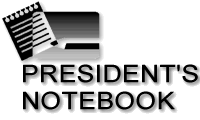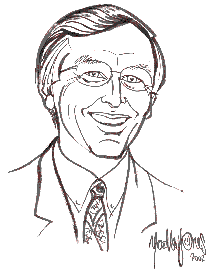|

BY RON TENOVE, P.ENG.
APEGGA President
Our last APEGGA council meeting - held on June 13 - signalled
a new direction for our activities in the geosciences sector,
and therefore requires our members' consideration and possibly
an increased advocacy role.
1. Oil & Gas Reserves Inquiry Report
A recent survey revealed over 86 per cent of respondents believe
there are problems in the evaluation and reporting of oil
& gas reserves including overstatement, non-standard technical
procedures and varying accountability practices. Working with
the Alberta Securities Commission (ASC) and the Society of
Petroleum Evaluation Engineers (SPEE), the APEGGA Practice
Review Board subcommittee inquiry has recommended APEGGA involvement
in areas of accountability, standards, education and quality
management. Council will also assess a leadership role for
APEGGA to improve public confidence in the financial and investment
documents produced by APEGGA members.
2. Licensure Task Force (LTF)
Across Canada the lines are blurring around the traditional
domain of engineering and geophysics. Emerging disciplines,
technologies and business activities with other professional
practitioners have changed the landscape. In response to "gray-area"
discipline and enforcement cases, the LTF will establish actions
to negotiate delineation of practice, consider changes to
APEGGA licensure and build new relationships with legitimate
technology entities.
Kyoto Protocol
The security preparations for the G8 summit have reminded
me of the last major conference in Calgary, when the World
Petroleum Congress met in 2000. Alberta plays a key role in
the international oil and gas industry, and APEGGA members
are integral to it. We have an obligation to our profession,
and to the public at large, to think carefully and work creatively
to address the opportunities and challenges in this field.
Ever in the news, the only certainty about the Kyoto Accord
is that the Canadian government's decision will directly impact
our profession. Although APEGGA itself does not take an opinion
on the ratification or rejection of the Accord - we would
have difficulty presenting a position that reflects the views
of all members - our members are uniquely qualified to inform
the debate. Furthermore, the decision made will be central
to the practice of engineering and geosciences in Alberta
in the future.
Are you paying attention to the issues and do you understand
the potential impact on your business and in your community?
I encourage you to become informed and make your views known
to government before the fall decision date.
Following are several websites that present a broad and knowledgeable
perspective on climate change and the Kyoto agenda:
www.capp.ca
www.climatechangecentral.com
www.NCCP.CA
info@iisd.org (International
Institute for Sustainable Development)
The Alberta Chamber of Resources (ACR) has done yeoman work
and activity continues in the Climate Change Task Force. On
June 20, Roger Thomas, president of Nexen Canada and CCTF
Chair, presented an update of findings and action. You will
find the ACR work provides a balanced and open-minded perspective,
albeit an Alberta perspective. You will find the TF report
on www.acr-alberta.com.
CCPE Gold Medal 2002
On a more personal note, one of my highlights this year is
to have met Wally Read, P.Eng. Wally is a thoughtful and energetic
icon of our profession. His list of awards and honorary doctorates
of Engineering frames the man who was instrumental in, and
dedicated nearly five decades of work to, bringing electric
power distribution to Newfoundland and Labrador.
Wally is the consummate professional engineer and uses his
profile and passion to better our profession. His papers on
The Involvement of Young Engineers, The Public Image of Our
Profession and Educating Engineers for the Third Millennium
speak volumes.
I intend to pass along a few of wise words and witticisms
in a future column on the changing role of the profession,
but first a few of his words on young professionals. He challenges
the provincial associations of the Canadian Council of Professional
Engineers to involve young engineers in all we do as essential
to developing our future leaders. The engineer of the future
is evolving; our education and mentoring programs must change
accordingly.
Mr. Read stresses that we "provide individuals with strong
expertise, but balanced with broader skills in business acumen,
skills of an entrepreneurial nature, skills in human resource
management, in marketing, in finance and perhaps an understanding
of legal issues."
Are we doing our part in our companies, work place and in
APEGGA? Take the time today to engage a young professional
in your area of work and find out their goals and visions.
Enjoy those staff barbecues, visit some of Alberta's remarkable
landscape and plan to attend the next APEGGA meeting in your
area.
|




